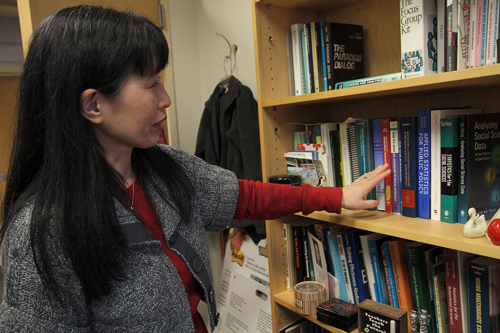Portland State is working with the city of Beaverton to craft a minority outreach plan that would encourage civic engagement by the city’s ethnic minorities. This joint effort is the first iteration of a major new initiative being pursued by the center, and is tentatively being dubbed the Public Service Innovation Laboratory.
PSU reaches out to Beaverton minorites

Portland State is working with the city of Beaverton to craft a minority outreach plan that would encourage civic engagement by the city’s ethnic minorities.
This joint effort is the first iteration of a major new initiative being pursued by the center, and is tentatively being dubbed the Public Service Innovation Laboratory.
The exploratory project will culminate in a listening forum in Beaverton this June, when city officials and community minority leaders will meet over the course of two days to discuss and prioritize the needs of the city’s minority communities.
It’s possible that the laboratory partnership will be renewed at that point, but the steps that are taken afterward will depend entirely on the outcome of the forum.
“The whole point is to try to [promote] outreach to diverse communities…especially to those interested in engaging the city’s political and decision-making processes,” said Dr. Masami Nishishiba, associate director of the Hatfield School of Government’s Center for Public Service and director of PSU’s involvement in the project.
“[There is] a strong intent to keep the forum and make it into more of a kind of ongoing effort on the part of the city of Beaverton to engage diverse communities,” she said.
In October, the CPS distributed a request for letters of interest in partnership to 40 nearby municipal jurisdictions and received six responses; they chose Beaverton’s proposal for a number of reasons.
Feeling as though they were both well-suited for the complex challenge and poised for great gains, the creation of the PSIL aims to help the CPS engage its students and the broader community more effectively.
“I think the laboratory and this project exemplify the kind of work that the Center for Public Service does in the public administration community,” said Jeff Bailey, an innovation analyst for the first phase of the project.
“This project in particular will reaffirm the focus on innovation that the center has, and through that, the students who pass through the program will have a better understanding of what innovation looks like in a public service setting.”
Daniel Vazquez, Beaverton’s first cultural inclusion coordinator, helped draft the city’s response during his first week in the position.
“This stage will be one of several that we conduct with PSU that will be part of the groundwork for the [composition] of a city-wide diversity and equity action plan for the city of Beaverton,” he said.
The city’s population is diverse indeed. Thirty percent of Beaverton’s 91,000 residents are non-Caucasian, and 96 languages other than English are spoken in the homes of Beaverton School District’s 38,500 students.
“[Nearly half] of these students self-identify as people of color,” Vazquez said. “It’s only been in the last 40 years that this ethnic minority population has really grown.”
“[Beaverton’s population] has gone from 99 percent white to 33 percent nonwhite,” he added.
Vazquez stressed the importance of the minority inclusion effort in Beaverton.
“It’s going to take time…but it’s being done,” he said. “We have a good team.”








I can’t find out who Beaverton’s immigrants are? % of African, Asian, Latino or by country or by ethnicity? Could someone direct me to this information? Thanks. Nancy Monroe